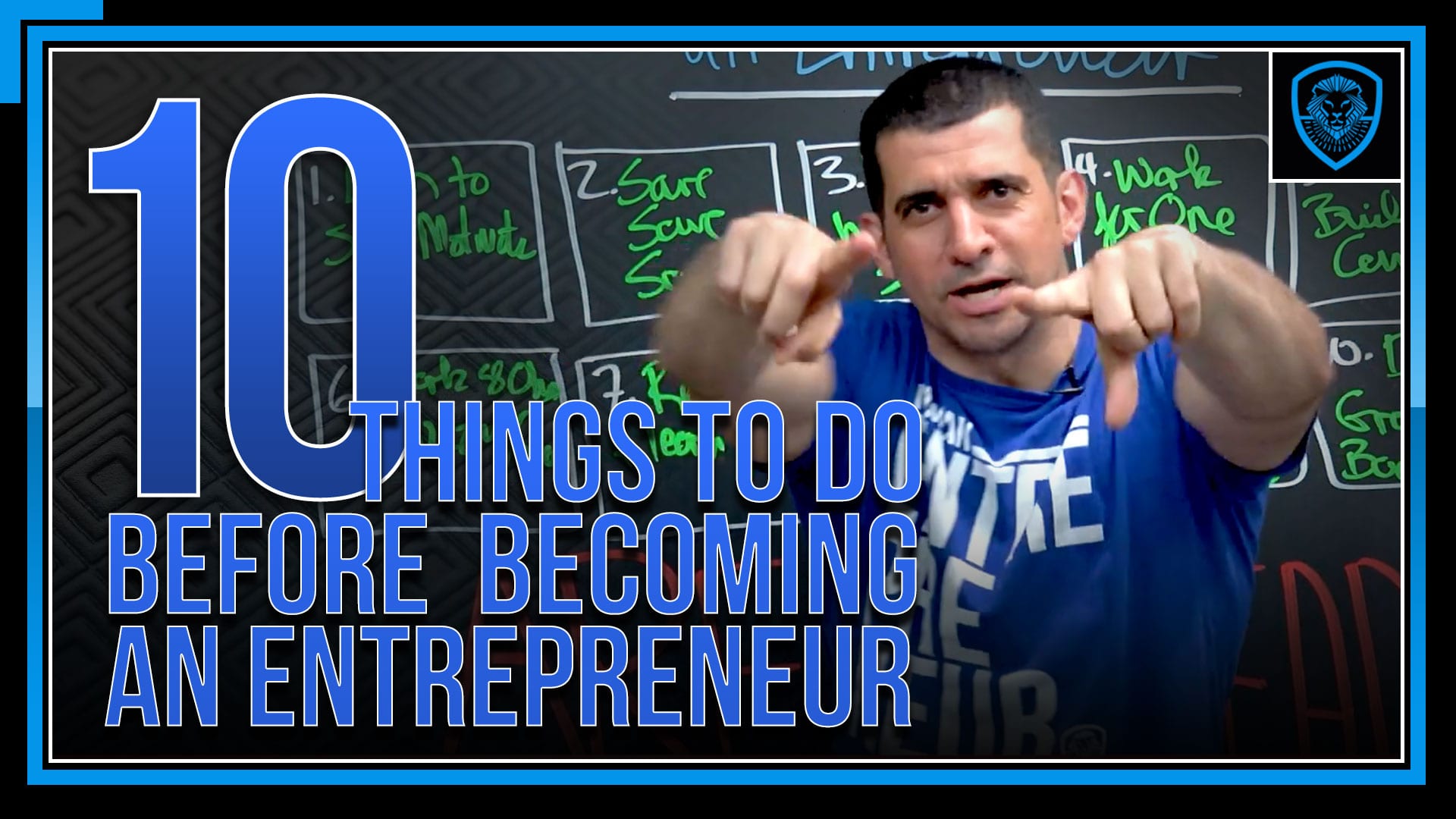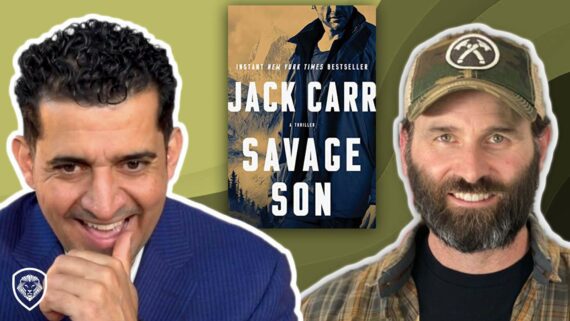10 Things To Do Before Becoming An Entrepreneur.
Most of the videos on Valuetainment are directed to entrepreneurs, but today I want to talk to the employees, who also follow Valuetainment. You might be thinking about one day becoming an entrepreneur, you just don’t know what to do next. There are 10 things I want you to be doing, before thinking about entrepreneurship. I remember when I worked at Bally Total Fitness and I had a job and it was comfortable. I had a salary and it was good for me.
I wanted to become a business owner, I wanted to become an entrepreneur, but there’s a few things that I had to do before I made that decision.
By the way, I want you to know that entrepreneurship isn’t for everybody and that’s ok.
#1. You gotta learn how to self-motivate.
I get too many messages man, that people tell me, how do you motivate yourself. Can you, actually I get Snapchat messages, Mario, people send me messages saying, “Pat, can you give me a motivational content for me to get motivated?” If you don’t know how to self-motivate yourself, cross this thing out. If you do not know how to self motivate yourself and get yourself fired up like this, business isn’t for you. Because in a world of business you’re alone. There’s not gonna be somebody telling you’re amazing. There’s gonna be actually people on the complete opposite side, saying how horrible you are, constantly finding your leaks.
Think about it this way here, so this maybe makes sense to you. Any athlete that first gets into the league, everybody picks at him. He doesn’t know how to play defense, he doesn’t know how to do this. It takes six, seven, eight years until they maybe win a championship, then they get off their back. The same is becoming an entrepreneur. You gotta learn to keep yourself up, you gotta learn how to play hurt, you gotta learn how to stay motivated and get your people motivated. So you gotta learn how to self-motivate before you become an entrepreneur.
#2. Save, save, save.
Save your money. I saved my money when I worked at Bally’s. I was working at Bally’s but I was saving that money. I was setting aside the money, because I knew longterm, I was gonna be in sales. I didn’t know what I was gonna sell and I didn’t know if I was gonna stay as an employee forever, because I wanted to figure out a way to make more money. I did know sales was it, but I did know that I needed my money in case if I went fully commission, what am I gonna do if I go fully commission? Save, save, save.
#3. Learn how to sell.
Today we had an entrepreneur that came here. He may be in the next vlog, I don’t know Paul if you’re gonna put him on there or not, we’ll figure it out. But he came today. His idea was, he has an app that he’s designing that’s for what, that’s for house cleaning. For instance, I’m in Houston. I want to a house cleaner to come to my house tomorrow to clean it up. I get on there, I book them four hours, my house is 2000 square feet, the pricing is gonna be $120. Somebody comes to my house. That’s what he’s designing.
He comes here, Mario invites him to come to the office, he’s flabbergasted. He’s got five to 10 minutes with us, and he speaks for 10 minutes. You know what I asked him? I asked him the following question, “Do you know how to sell?” He says, “I do.” I said, “I’m telling you, you don’t know how to sell?” He says, “What do you mean?” I said, “10 minutes you’re here, you haven’t asked a single question yet. You’re just talking, talking, talking, talking, talking, talking, talking, talking. So your business is not gonna work if you don’t know how to sell, you gotta learn how to sell. As an entrepreneur, if you’re an employee right, now you’re working wherever you’re working at. If you don’t learn how to sell, what do you think happens? All of a sudden you become an entrepreneur, you don’t know how to sell. You gotta learn how to sell. Before you make that plunge of becoming an entrepreneur full-time, learn how to sell.
#4. Work for one. (yes, I said work for one)
Work under an entrepreneur. Work closely with a CEO, shadow one, see what they do, see what’s different about them. I’m talking about one that, today an entrepreneur, I hear a lot of people that say, “You know, I work for a 72 year old very successful entrepreneur who made a lot of his money, but he golfs every day.” That’s not who you want to work with. You want to work with the entrepreneur that is starving, but he’s on his way up so you can learn from him.
I remember one time a guy called me, his name was Brian. It was six o’clock in the morning. I pick up the call. He says, “I have a shot at working with this guy, with this guy and this guy. Who do you think I should be working with?” You know what I told him? I said, “Me.” He said, “Come on Patrick, why you?” I said, “100% me.” He says, “Tell me why.” I said, “Do you want to work with somebody that tells you stories on what they used to do when they worked 20 years ago. Or do you want to work with somebody that’s doing it today? They’re working 80-100 hours a week, because they’re in the hunt. If they don’t, they’re gonna be out of business. I’m that guy. You should be working directly with me.” A week later, we had a meeting at P.F. Chang’s, they started working with us. Why? Because that’s how you learn the most.
#5. Network, build contacts and relationships.
Whatever industry your’re in and whatever phase you’re at as an entrepreneur, everything to you should be about relationships. Tom and I have several conversations about the individuals we come across and the opportunities that arise constantly and we have found that most of them from sort of relationship or networking we’ve done in the past.
So network, build contacts, you never know who is gonna introduce you to, people send me a message and they say, “How do I find an investor, Patrick, how?” What do you mean how do you find an investor? If you’re a rookie entrepreneur, make a list of everybody you know today and start asking the question: Who do you know that… and find out who knows who. As you’re starting, as an employee you want to become an entrepreneur, build your list of contacts.
#6. Work 80 hours a week for 12 to 24 months and see if you can do it or not.
While I worked at Bally’s, I worked 80 hours every single week as an employee, and they only paid me four, you know, six dollars an hour or seven dollars an hour, five dollars an hour, whatever the number was, because it was commissions. But I worked 80, 90 hours per week. I was at the gym from morning until night. Every day I was at the gym. You know why? Because I wanted to see if I had what it takes to work. Because if you don’t know how to work 80 hours a week as an employee, you are definitely not gonna be making it as an entrepreneur. If you go full time and you want to make a business, you’re gonna be required to work regularly. I think a lot of times people have this idea that you become an entrepreneur, because when you become an entrepreneur, you’re gonna become a millionaire.
Don’t get me wrong. That eventually happens. It took me a few years and then it happens and you have the money and the lifestyle, all this other stuff. But you going to become an entrepreneur to create something and there’s a risk that constantly, that’s being taken to want to grow the business. So if you don’t know how to work hard and you lose your edge, boom, somebody comes and takes the market away from you, because you lost your edge. So if you don’t know if you have it, you’re right now working nine to five, why don’t you work 80 hours a week at your job and see what happens? I’m dead serious with you. First of all, you may get some crazy promotions out of nowhere. You may be there and having real, direct, private conversations with the CEO, because the CEO is there, and you have him like, “My gosh.” CEO sees me every night, I leave after him. I come before him. What the hell is going on? Who is this guy, why is this guy working so hard? Work 80 hours a week for 12 to 24 months to see if you got it or not.
#7. Research. Learn how to research and learn fast.
Learn how to research. I think this thing about researching. Again, that’s a whole different thing that people, we can probably do one, how to research something, that could be an episode. I think researching is a skill. You gotta research who is this connected to, who does this guy know, what’s this thing all about, what is this product all about, what is this guy, why did they come out with us, why did this happen, what does this law have to do with this. You gotta learn how to research, okay. And you get to the bottom of something like, this guy is connected to this guy. Now I get why this guy is saying this. Oh, this is starting to make sense. You get the click, I figured out what’s going on. I gotta learn how to research and learn fast.
#8. Build an audience.
Back in the days in 1990, when I worked at Bally’s, there was no Facebook. I think Facebook. I think Facebook was, Paul was Facebook 03 or 04, I want to say February of 04, is when I want to say Facebook was. There was nothing. Myspace I think was 01, 02, I don’t know when Myspace was, but there was nothing at Bally. There was no way to build an audience. But the way I built an audience, I built it with everybody that was a member at the gym. I built an audience that worked at different Bally’s. I built a relationship there. But build an audience. Build an audience on social media. Build an audience on Snap, on Facebook, on Instagram, on YouTube, on Twitter. Figure out a way to build an audience with your voice.
#9. Start becoming self aware and aligned about what your own strengths and weaknesses are.
I never knew I was gonna be good in sales until I started working at Bally’s. I mean, I used to sell at 10 years old. But I really started realizing, I can be pretty good at this sales thing. Then I started realizing pressure. What happens in pressure. You know, deadlines. When we have numbers we have to hit, in sales, we had closeouts on Thursdays. I’m okay with this.
There was another guy, one of my managers that I work with. He was my boss, he couldn’t hack it himself, but he was my boss. Great guy, a sweetheart, one thing I’ll never forget about him. He always told me, he says, “Pat, you curse too much.” Because I had just gotten out of the army so every other word out of my mouth was a curse word. You see, you gotta slow this thing down. I’d be selling and cursing non-stop, so he would always work with me on that. But I remember it was Thursday closeouts. We haven’t hit our numbers yet. He would be panicking. There’s a guy named Tony Willson, would call in and no one wanted to pick up Tony’s call, but I would pick up the call. “Tony, what’s going on, why are you bothering us? It’s not done yet, let me finish up my day, can I call you back at midnight?” “Yes.” Didn’t want to answer the phone call. Then boom, we would get two, three sales. How?
I’d go on the walkway, I’d go in the gym, I’d walk around, I would say, “Hey, how you doing, how is work? By the way, who do you know right now that’s looking for a membership? Why are you working out alone? Why don’t you call your friends, let’s get them to become a member. Who can you call right now who can come to the gym? Tell them to come to the gym.” I would go through the members that are working out and I would get them to call their friends to come to the gym and I’d sell them membership that night, and boom, we would hit our numbers. Right? But it was, you kinda figuring out how to make that part happen. So you learn your strengths and industries. I liked sales, I liked numbers.
I started looking at which industries gave a life, good life, I saw too many guys on real estate that were still selling in their 30th year and working on Sundays. I saw way too many guys in mortgages that we’re still selling. I started looking at stocks, where, because I was a serious seven guy. Market would go up, it was great. Market would go on, they were afraid of answering the phone calls and all this stuff. I looked at pharmaceutical sales. If you got a good drug and you work somebody who was good, because the doctors would constantly order it. There was so many different things I looked at and then I realized I like insurance, so I chose insurance. Why?
I saw guys 10 years down the line, 20 years down the line, good personal life, kids went to private schools, good life, a lot of money. You know, you had the opportunity to make real, real good money. Like 5,000,000 a year or 10,000,000 a year, some even more than that. That opportunity was attracted. But you’ll learn it here, on what you’re gonna be doing next.
#10. Put yourself in “Death Ground” situations where your back’s against the wall.
Every single day you are on death ground as an entrepreneur. But even more when you’re a startup entrepreneur. A death ground situation means a series of events taking place that seem out of your control and you step in to tackle it; to tame it; to make something happen out of what seemed impossible to achieve. Take a deadline that seems crazy and go hit it. Say yes and take responsibility for certain projects and go execute them from start to finish. Take that deadline that no one wants to touch, because they’re afraid of coming through.
I’m at an event and everybody is asking me, “What do you think about the transition? Somebody got promoted, somebody came down and one guy retired. What do you think about this whole move?” You know what I said? In front of everybody and in front of the guy that works directly, I said, “I want you to go tell him, because that’s exactly how I feel and he needs to know this.” He said, “What do you think about the new promotion of this guy?” I said, “I’m a little concerned.” He said, “Why is that?” I said, “He plays it too safe.” He said, “What do you mean he plays it too safe?” I say, “You see, in this industry, you can get after 25 years of being in a business, you can get a $300,000 a year salary. You go to a $400,000, $500,000 a year salary, and you play it so safe, because you don’t want to ruffle any feathers and take any risks.”
Because if you do, you could possibly be fired. Whereas a guy like Bob Benmosche, former CEO of AIG. That if you go watch some of this guys interviews, gutsy guy, I’ve seen this guy in rooms talking, cursing every other word, just a feisty guy, that went to the government, asked for a $183,000,000,000 from the government to save AIG. Then comes back and says, not only am I gonna give the tax payer the money back, but I’m also gonna give him interest, and no other company that went and got money from the government did that. He gave the government $183,000,000,000 back plus $23,000,000,000 of interest, I think four years later. Historically, they’re considering him one of the best CEO’s if not the best CEO in the financial industry, period. Bob Benmosche.
I said, “I’m concerned. Because you’re not a death ground guy. You’re not a back against the wall type of guy. You’re a play it safe type of a guy.” That’s why he’s an employee. You do it like this. Boom. You’re dead. Hesitation, no hesitation. Someone’s taking you out. It’s just what’s gonna happen. That’s the world of business. If you play it safe, and if you don’t learn to put yourself in a death ground type of situations. Sometimes an investor or partner is gonna come up to you and say, we need this money to be delivered at this time. We need this product to be delivered by this time. You don’t know how to do it. You gotta get on the call and figure out a way to get this person to deliver and all this other stuff to get to that point.
10 things that I want you to do. Then ask yourself, are you ready? Some of you guys may be watching and say, “Pat, I’m afraid of this 80 hours a week thing for 12 to 24 months. I’m afraid of all these other things that you’re talking about.” I’m just telling you the truth right now. You want to do it? Do it. You don’t want to do it? You don’t do it. By the way, 90% of people are not gonna do this, what I just talked to you about. If you’re watching this as the employee and you’re saying, “I want to do it.” Go take up the challenge and update me on the type of progress you’re making here, on Snapchat.
 Send me a message @Betdavid19 on Snapchat.
Send me a message @Betdavid19 on Snapchat.
Send me a message, tell me about the progress you’re making this year, as you’re building your business.
Make sure to leave your comments here about how you are preparing to become an entrepreneur.
Valuetainment – The best channel for entrepreneurs.
Valuetainment Posting Schedule:
Monday- Motivation
Tuesday- How to Video with Patrick Bet-David
Wednesday- Life of an entrepreneur vlog
Thursday- How to Video with Patrick Bet-David
Friday- Case Studies with Biz Doc Tom Ellsworth
Saturday- Kelly Nishimoto, Fashion & Entrepreneurship
About Valuetainment: This channel is about providing a hybrid of information and education for entrepreneurs. Every video is created with a purpose of providing value and entertainment, hence Valuetainment.
Patrick Bet-David, the creator of this channel has decades of experience, unique perspectives and experience that he wants to give back to the world of entrepreneurs. Why? Patrick Believes that 100 percent of the worlds problems can be solved by entrepreneurs. He is also an active CEO and leads a financial services sales force of over 3,000 agents across the U.S.
To reach the Valuetainment team you can email: marketing@patrickbetdavid.com
Follow Patrick on social media:
Website: https://www.patrickbetdavid.com
Snapchat: https://www.snapchat.com/add/patrickb…
Facebook:https://www.facebook.com/PatrickBetDa…
Instagram:https://www.instagram.com/patrickbetd…
Twitter:https://twitter.com/patrickbetdavid
Linkedin:https://www.linkedin.com/in/patrick-b…





